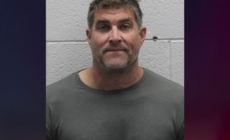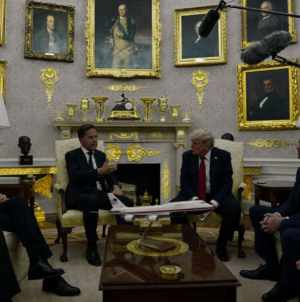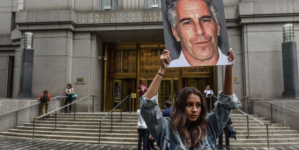-
Robin Kaye, ‘American Idol’ music supervisor, and husband found dead in LA home - 13 mins ago
-
Former MLB pitcher convicted of killing his father-in-law and trying to fatally shoot his mother-in-law - 38 mins ago
-
Why Padres ‘Trade Deadline Dream Scenario’ Makes Perfect Sense For San Diego - 46 mins ago
-
What Are The Top 10 Pitching Matchups In MLB All-Star Game History? - 52 mins ago
-
Mother, boyfriend charged after autistic boy was reported missing but had been dead for weeks - about 1 hour ago
-
Trump’s Big Beautiful Bill Could Sting Seasonal Workforce, Experts Warn - about 1 hour ago
-
National Guard was hacked by China’s ‘Salt Typhoon’ group, DHS says - 2 hours ago
-
Kid Rock reviews concert tapes with band like football teams study film - 2 hours ago
-
Caitlin Clark, Sabrina Ionescu Among Players in WNBA All-Star 3-point contest - 2 hours ago
-
Tesla unveils solar-powered Oasis Supercharger operating off-grid - 2 hours ago
Jon Stewart and Stephen Colbert Face Uncertain Futures
Jon Stewart and Stephen Colbert are the liberal faces of their networks, Comedy Central and CBS, respectively. They’ve been fixtures on the television circuit for decades. But under the second Trump administration and ahead of Paramount’s proposed merger with Skydance Media, their futures seem uncertain.
Newsweek has reached out to representatives for Stewart and Colbert via email.
The Context
Stewart and Colbert are stalwarts of the television world. Stewart is the long-running host of The Daily Show on Comedy Central, which he hosted from 1999 to 2015. He hosted The Problem with Jon Stewart on Apple TV+ from 2021 to 2023 and returned part time to The Daily Show in 2024.
Colbert has hosted the CBS talk show The Late Show with Stephen Colbert since September 2015. Prior to that, he hosted the Comedy Central news satire show The Colbert Report from 2005 to 2014.
Stewart and Colbert are liberal and have long been critical of President Donald Trump. After Trump won the 2024 presidential election against former Vice President Kamala Harris, Colbert said on his show: “After a bizarre and vicious campaign fueled by a desperate need not to go to jail, Donald Trump has won the 2024 election” and added: “The deep shock and sense of loss is enormous.”
Stewart said during his U.S. election coverage, in part: “I promise you, this is not the end. And we have to regroup, and we have to continue to fight, and continue to work day in and day out to create the better society for our children for this world.”
An Uncertain Future
The media has long been populated with liberal voices—Colbert and Stewart are far from the only high-profile television figures to have spoken out against or criticized Trump.
So why is the future specifically uncertain for the liberal faces of CBS and Comedy Central? It comes down, in part down to the Paramount-Skydance merger, and Paramount’s recent settling of a lawsuit with Trump.
Paramount Global agreed to pay $16 million to settle the lawsuit, which stemmed from a claim made by Trump that 60 Minutes unfairly edited a video with Harris to make her look better and bolster her election chances. CBS denied the claims and said that the edits were routine.
Paramount, which owns CBS, settled the suit and said that the money will go to Trump’s future presidential library and to pay his legal fees. It did not apologize or express regret. The deal was announced prior to a meeting with shareholders, according to the Associated Press.
It has been reported that the company sought to put the issue to bed. It seeks the approval from the Trump administration for the merger with Skydance.
News of the merger came in July 2024, when it was announced that the two companies would merge in a deal valued at $8 billion and form a new entity known as “Paramount Skydance Corporation.”
The transaction is ongoing and is expected to close on or before October.
The deal requires approval from the Federal Communications Commission, which is led by Brendan Carr, a Republican and Trump supporter.
Skydance was founded by David Ellison in 2006, and his father, Larry Ellison, co-founder of the Oracle Corporation, is also involved in the operation of the company. Larry Ellison is investing $6 billion into the merger and is putting up a majority stake in the deal, according to a 2024 report from The Hill. Both men are Trump supporters.
Shifting Media Landscape
Newsweek spoke with Matt Navarra, a news personality and social media consultant, about the shifting media landscape and the potential implications on Stewart and Colbert.
Navarra said in a voice message shared with Newsweek that both men are “iconic voices in political comedy,” but that as Skydance edges in, “Their future does hinge on a new leadership’s appetite for their brand of satire.”
Newsweek also spoke with Rodney Benson, a professor in the Department of Media, Culture, and Communication and an affiliated faculty member of the Department of Sociology at New York University. He said that “In a future company controlled by Skydance, it’s easy to imagine that Stewart’s and Colbert’s shows could be short-lived.”
“Whether as a matter of principle or to defend the consistency of their brand and to maintain the loyalty of their audience, neither host is going to suddenly start kowtowing to the Trump administration if that’s the condition of staying,” Benson said.
“Stewart has already positioned himself as fearless,” Navarra said, pointing to Stewart’s discussion of the lawsuit on The Daily Show on July 7. In it, Stewart joked: “So the implication is you don’t get your $8 billion merger…unless you give me a tremendous amount of money…. I’m obviously not a lawyer, but I did watch Goodfellas—that sounds illegal.”
“It doesn’t feel like scrutiny on news networks—it feels like fealty,” Stewart continued on the show, adding, “That they are being held to a standard that will never be satisfactory to Donald Trump. No one can ever kiss his ass enough.” He also described the settlement as “Flat-out protection money.”
Navarra said that “he’s doubled down on the idea that media integrity matters more than corporate appeasement.”
Of Colbert, Navarra said, “He’s more entwined with CBS’ legacy of the late-night structure.
“They have to have what it takes to succeed independently, but not if it relies on old structures.”
So, what could be an alternative to these old structures? “The thing to watch for is them signing first-look deals with Netflix, HBO or Audible, places that value strong, editorial voices,” Navarra said.
“Voices like Stewart and Colbert either have to find sanctuary off network, thinking like streaming, nonprofits or tone down their edge if they’re gonna stay within big media.”
Navarra added: “I think we can expect fewer barbs on air, more nuanced comedy and soft-pedaled critiques, until independent platforms thrive.” He said that he thinks the next wave of left-leaning media may “emerge outside legacy platforms funded by subscribers rather than sponsors.”
Navarra also pointed to “podcasts, streaming or independent media,” where “permissionless speech will thrive.”
Benson, meanwhile, said that”It’s possible to imagine that either show might find a home at Comcast’s cable spinoff Versant, either as part of MSNBC or another channel. But Versant may not be particularly eager to be next in line to face the full-scale political wrath of this administration.”
“No one wants to risk a protracted legal struggle and the threat this could pose to their bottom line.
“There is a real audience and a market for what they [Stewart and Colbert] have to offer, both creatively and politically,” Benson continued. However, “Their audiences are aging and declining (or at best holding steady), and this older audience is less likely to find the shows if they relocate to podcasts or other online platforms.”
Benson also pointed to Stewart and Colbert finding a place on a major streaming service, noting that if they are unable to do that, the hosts may struggle to attain the same audience reach.
How their futures develop may also raise questions about the future of media.
“The question for me is, what is the future of independent reporting and commentary? Beyond the urgent civic need for such media in a democracy, there will also continue to be an audience and a market,” Benson said.
“The future of independent media—whether left, center or non-Trumpian right—will be subscription-based and mostly behind a paywall. As such, independent media critical of Trump certainly won’t disappear, but it could have less of an impact.”
What Happens Next
The deal regarding the Skydance-Paramount merger has been extended to October. The transaction is under review by the Federal Communications Commission.
Source link































